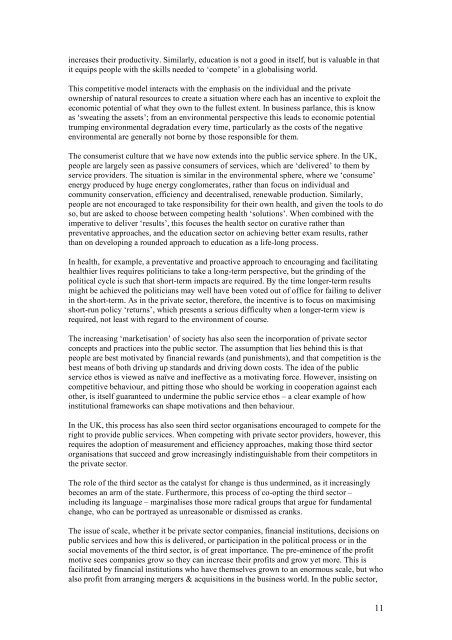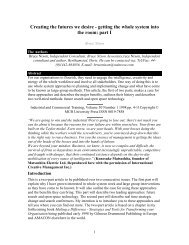From Old Economics to New Economics- Radical ... - Bruce Nixon
From Old Economics to New Economics- Radical ... - Bruce Nixon
From Old Economics to New Economics- Radical ... - Bruce Nixon
Create successful ePaper yourself
Turn your PDF publications into a flip-book with our unique Google optimized e-Paper software.
increases their productivity. Similarly, education is not a good in itself, but is valuable in that<br />
it equips people with the skills needed <strong>to</strong> ‘compete’ in a globalising world.<br />
This competitive model interacts with the emphasis on the individual and the private<br />
ownership of natural resources <strong>to</strong> create a situation where each has an incentive <strong>to</strong> exploit the<br />
economic potential of what they own <strong>to</strong> the fullest extent. In business parlance, this is know<br />
as ‘sweating the assets’; from an environmental perspective this leads <strong>to</strong> economic potential<br />
trumping environmental degradation every time, particularly as the costs of the negative<br />
environmental are generally not borne by those responsible for them.<br />
The consumerist culture that we have now extends in<strong>to</strong> the public service sphere. In the UK,<br />
people are largely seen as passive consumers of services, which are ‘delivered’ <strong>to</strong> them by<br />
service providers. The situation is similar in the environmental sphere, where we ‘consume’<br />
energy produced by huge energy conglomerates, rather than focus on individual and<br />
community conservation, efficiency and decentralised, renewable production. Similarly,<br />
people are not encouraged <strong>to</strong> take responsibility for their own health, and given the <strong>to</strong>ols <strong>to</strong> do<br />
so, but are asked <strong>to</strong> choose between competing health ‘solutions’. When combined with the<br />
imperative <strong>to</strong> deliver ‘results’, this focuses the health sec<strong>to</strong>r on curative rather than<br />
preventative approaches, and the education sec<strong>to</strong>r on achieving better exam results, rather<br />
than on developing a rounded approach <strong>to</strong> education as a life-long process.<br />
In health, for example, a preventative and proactive approach <strong>to</strong> encouraging and facilitating<br />
healthier lives requires politicians <strong>to</strong> take a long-term perspective, but the grinding of the<br />
political cycle is such that short-term impacts are required. By the time longer-term results<br />
might be achieved the politicians may well have been voted out of office for failing <strong>to</strong> deliver<br />
in the short-term. As in the private sec<strong>to</strong>r, therefore, the incentive is <strong>to</strong> focus on maximising<br />
short-run policy ‘returns’, which presents a serious difficulty when a longer-term view is<br />
required, not least with regard <strong>to</strong> the environment of course.<br />
The increasing ‘marketisation’ of society has also seen the incorporation of private sec<strong>to</strong>r<br />
concepts and practices in<strong>to</strong> the public sec<strong>to</strong>r. The assumption that lies behind this is that<br />
people are best motivated by financial rewards (and punishments), and that competition is the<br />
best means of both driving up standards and driving down costs. The idea of the public<br />
service ethos is viewed as naïve and ineffective as a motivating force. However, insisting on<br />
competitive behaviour, and pitting those who should be working in cooperation against each<br />
other, is itself guaranteed <strong>to</strong> undermine the public service ethos – a clear example of how<br />
institutional frameworks can shape motivations and then behaviour.<br />
In the UK, this process has also seen third sec<strong>to</strong>r organisations encouraged <strong>to</strong> compete for the<br />
right <strong>to</strong> provide public services. When competing with private sec<strong>to</strong>r providers, however, this<br />
requires the adoption of measurement and efficiency approaches, making those third sec<strong>to</strong>r<br />
organisations that succeed and grow increasingly indistinguishable from their competi<strong>to</strong>rs in<br />
the private sec<strong>to</strong>r.<br />
The role of the third sec<strong>to</strong>r as the catalyst for change is thus undermined, as it increasingly<br />
becomes an arm of the state. Furthermore, this process of co-opting the third sec<strong>to</strong>r –<br />
including its language – marginalises those more radical groups that argue for fundamental<br />
change, who can be portrayed as unreasonable or dismissed as cranks.<br />
The issue of scale, whether it be private sec<strong>to</strong>r companies, financial institutions, decisions on<br />
public services and how this is delivered, or participation in the political process or in the<br />
social movements of the third sec<strong>to</strong>r, is of great importance. The pre-eminence of the profit<br />
motive sees companies grow so they can increase their profits and grow yet more. This is<br />
facilitated by financial institutions who have themselves grown <strong>to</strong> an enormous scale, but who<br />
also profit from arranging mergers & acquisitions in the business world. In the public sec<strong>to</strong>r,<br />
11



